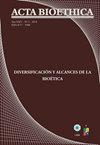La representación del apoyo de la persona con discapacidad. El nuevo esquema de la capacidad jurídica en el Perú
IF 0.3
4区 哲学
Q4 ETHICS
引用次数: 0
Abstract
: Capacity is a subject of transversal interest in Law, it is present in all its fields. It is an attribute that every subject has through which he/she can perform acts that are not prohibited. Since 2018, by Legislative Decree 1384, we have a new treat-ment of capacity in the Civil Code that is in line with the guidelines in favor of the autonomy and full legal capacity of persons with disabilities, aligning national legislation to the International Convention on the Rights of Persons with Disabilities. The regime of substitution of the will of incapable persons is replaced by a social model through supports and safeguards. We are facing an inclusive, democratic model, according to the respect for the human rights of all citizens (dignity and equality), based on the principle that people with disabilities have full exercise capacity in equal conditions in each and every aspect of their lives, recognizing their right to make their own decisions as well as the right to make mistakes. The function of the support in favor of the disabled person is developed, analyzing their powers of representation. We start from the principle that the support does not replace the manifestation of will, it only interprets it and collaborates in an adequate manifestation of will so that the person with disability can exercise his legal capacity, enjoying his rights and freedoms.残疾人的支持代表。秘鲁法律能力的新方案
行为能力是法律中一个横向关注的主题,它存在于法律的所有领域。它是每个主体都具有的属性,通过它他/她可以执行不被禁止的行为。自2018年以来,根据第1384号法令,我们在《民法典》中对行为能力进行了新的处理,符合有利于残疾人自主和完全法律行为能力的指导方针,使国家立法与《国际残疾人权利公约》保持一致。通过支持和保障,以一种社会模式取代无能力人意志的替代制度。我们面临的是一个包容的民主模式,它尊重所有公民的人权(尊严和平等),基于残疾人在生活的各个方面都能在平等的条件下充分行使能力的原则,承认他们有自己做决定的权利,也有犯错误的权利。在分析残疾人代表权的基础上,发展了残疾人支持职能。我们从这一原则出发,即支持不能取代意志的表现,它只是对意志进行解释,并配合充分的意志表现,使残疾人能够行使其法律行为能力,享受其权利和自由。
本文章由计算机程序翻译,如有差异,请以英文原文为准。
求助全文
约1分钟内获得全文
求助全文
来源期刊

Acta Bioethica
Bioethical Issues-
CiteScore
0.40
自引率
0.00%
发文量
22
审稿时长
12 weeks
期刊介绍:
Acta Bioethica is a biannual publication by the Interdisciplinary Center for Studies in Bioethics of the University of Chile (ISSN 0717-5906, press edition, y 1726-569-X, electronic edition), which publishes in three languages: Spanish, English and Portuguese.
Indexed in Science Citation Index (SCI), Scopus, Lilacs, SciELO y Latindex, and in database from several Institutions; it constitutes a pluralistic source of perspectives and an important tribune which accepts the contributions of authors compromised with the interdisciplinary study of ethical determinants and consequences of techno scientific research.
 求助内容:
求助内容: 应助结果提醒方式:
应助结果提醒方式:


